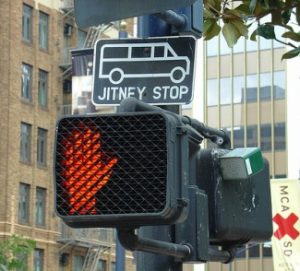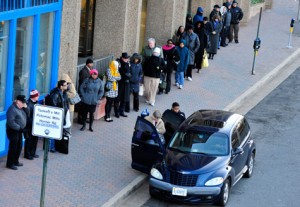New free-market transit coming?
Squint into the future and it’s easy to see a transportation crisis. No more cheap fuel for cars. No funding for commuter rail. Fewer safe roads and bridges. Continuing poor service from public transit.
But have you noticed the new systems popping up, mirroring some free-market, open-source, networked aspects of other American innovations? A few examples:
Slugging You walk or drive to one of the “slug lines” in Virginia and read your paper while waiting for a ride to one of the destinations in downtown Washington, DC. When you reach the front of your line, a driver you’ve never seen and may never see again pulls up to the curb and beckons you and others into the car.
You get a free ride; the driver gets to use the HOV lane. You save money; she saves time. You all help save gas. There are norms, safeguards and etiquette but, because no money changes hands, few regulations.
 Dollar Vans In Brooklyn and Queens, you hop on a private but licensed van that charges less than public transport on high-traffic routes. Often they drive the same routes as the subway, stopping outside the stations to compete for passengers. This arrangement is indistinguishable from the fleets of free-enterprise vehicles I’ve used in other countries (e.g. Hong Kong, Lebanon) which operate on fixed or slightly-flexible routes.
Dollar Vans In Brooklyn and Queens, you hop on a private but licensed van that charges less than public transport on high-traffic routes. Often they drive the same routes as the subway, stopping outside the stations to compete for passengers. This arrangement is indistinguishable from the fleets of free-enterprise vehicles I’ve used in other countries (e.g. Hong Kong, Lebanon) which operate on fixed or slightly-flexible routes.
Flex Service and other jitneys Whether private or part of a public transport system, fixed– or flexible-route services are showing up near other cities. There is the usual public concern about rules, insurance, safety, even mob ownership. But it’s encouraging to see so many Americas breaking the one-person-per-car habit.
When I squint, I can see these inventive, flexible pooling systems for many purposes beyond commuting, and many communities beyond cities. And, when gas prices do get painful, I can clearly visualize the pile of money a family could save (if they can’t walk to work and shop) by living in a community that encourages creative alternatives like these.




